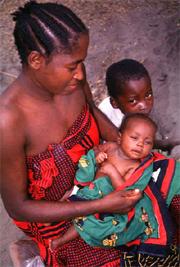 The developing world bears the brunt of diseases such as HIV.© WHO
The developing world bears the brunt of diseases such as HIV.© WHOA spotlight has been cast on the health burdens of tuberculosis (TB), malaria and HIV this month, thanks to two influential meetings with high-profile participants.
Politicians, celebrities and scientific experts at the World Economic Forum in Davos, Switzerland, which concluded last weekend, and at a UN Millennium Project meeting in Stockholm, Sweden, this week, threw their weight behind plans to bring these and other neglected diseases under control.
Speaking at Davos, software giant Bill Gates announced that his foundation would triple its support for the fight against TB from US$300 million to $900 million. The extra cash is part of a plan by the Geneva-based Stop TB Partnership to halve tuberculosis cases and deaths over the next decade.
At the same meeting, rock star Bono announced the creation of a new brand-name initiative to boost cash flow for the Global Fund to Fight AIDS, TB and Malaria. The new 'Red' brand, backed by companies including American Express and Gap, will sell red-coloured credit cards, clothes and other products, with a share of sales going to the fund.
And at a later 'quick-impact initiative meeting' against malaria and other tropical diseases, held in Stockholm from 30 to 31 January, public-health officials, drug-company executives, African politicians and others came together to draft a plan against the diseases.
Good news, bad news
Representatives at the Stockholm meeting heard some good news about the fight against malaria: it seems that manufacturers already have the capacity to produce some 75-100 million bed nets, and have the resources to pump out the needed drugs to treat the disease. But instead of agencies simply buying them and shipping them on, there is a complex circuit of fund transfers, tenders and approvals that leads to delays of months to years in getting these supplies out, they heard.
ADVERTISEMENT
Jeffrey Sachs, director of the UN Millennium Project, called upon national governments and international agencies to work towards a coordinated malaria plan that would eliminate such difficulties. He says they should seek a global fund of $2-3 billion annually for the assault. "For the Pentagon that's a rounding error," he quipped.
Scientists at the conference also presented worrying data that parasitic worms, which themselves cause diseases such as sleeping sickness, are contributing to susceptibility to, and illness progression of, AIDS, malaria and TB1.
To fight this, scientists at the meeting called for a new fund of $200 million annually to de-worm 500 million Africans with a cocktail of four drugs. This should control or eliminate seven neglected tropical diseases, they say.
Peter Hotez, a hookworm researcher from George Washington University, DC, says such a programme should bring good health benefits at a moderately low cost. But, he notes, ultimately scientists will need to develop a vaccine against the parasites.
Initiating a decline in the annual incidence of malaria by 2015 is one of the UN Millennium Development Goals. Together, malaria, TB and HIV currently account for 5.6 million deaths per year.
Post a comment to this story by visiting our acttotacklethe.html">newsblog.
